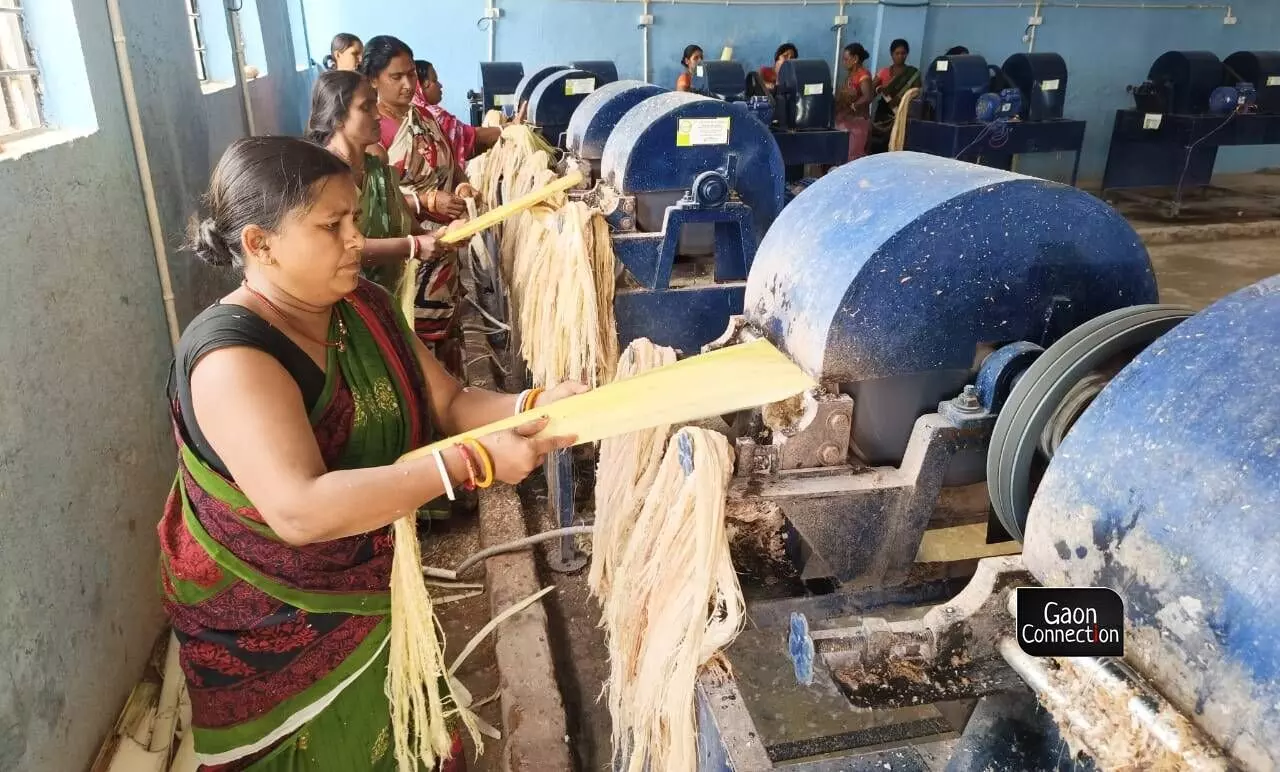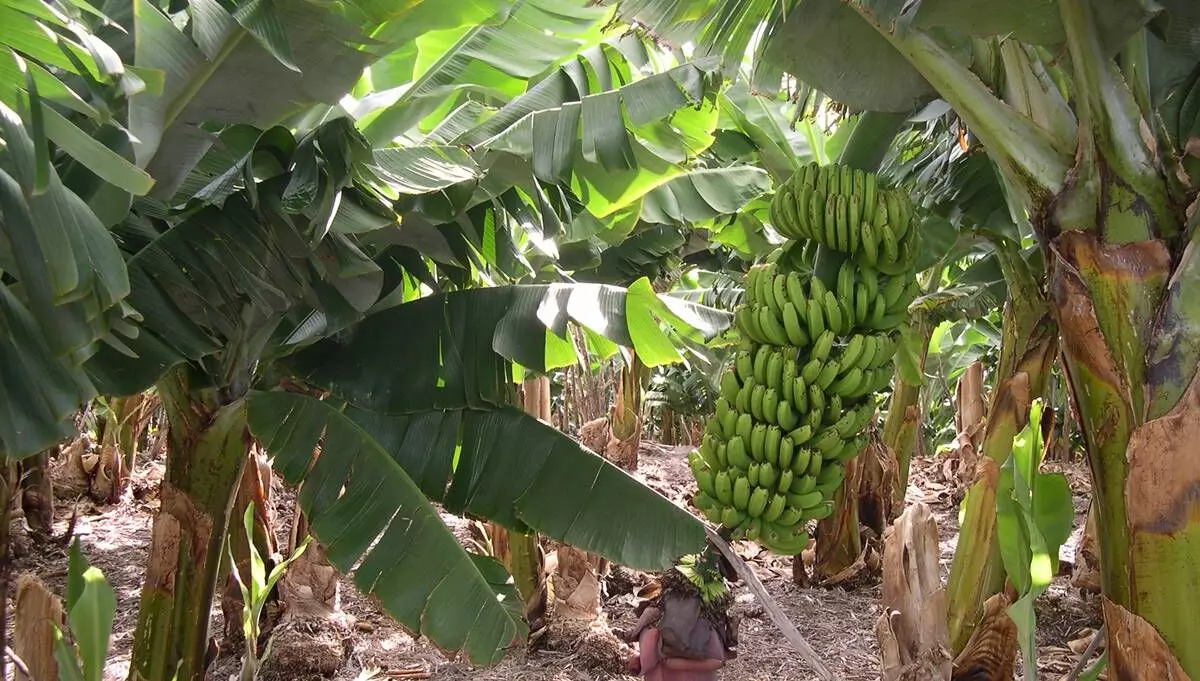Hajipur (Vaishali), Bihar
In March this year, six women, living in villages in Vaishali district of Bihar did something unusual. They started a Farmer Producer Organisation, commonly known as FPO, which produces yarns out of discarded banana stems. This banana yarn is then used to make items such as bags, sanitary pads, paper, and decorative items.
Asha Devi, Renu Devi, Kumari Krishna Sinha, Susheel Kumari, Sonam Kumari, and Lalita Kumari together run Kera Jeevika Mahila Kela Resha Kisan Utpad Company, which is the first banana waste processing unit that has been opened in the state with the support of Jeevika.
Jeevika is a project of the Government of Bihar whose aim is social and economic empowerment of the rural women. Jeevika is empowering women, called Jeevika Didis, to earn a livelihood through processing of banana crop wastes and turning them into banana fibres.
Asha Devi, one of the the six co-founders of the FPO, has been a part of Jeevika since 2017. “My job then was to get other women to join Jeevika and spread awareness about the benefits of doing so. Now I am one of the founding members of our company,” Asha Devi, who is in her 40s, told Gaon Connection.
“At present, we are only making about Rs 6,000 to Rs 7,000 a month from the company, but we are confident that soon our earnings will go up a lot more,” said Asha Devi.
The company gets the raw material, the banana stems, free from banana farmers who would otherwise have just thrown them away.

While hundreds and thousands of women across the state have been involved in making products from banana fibres, they were buying the raw material from private enterprises
Also Read: The Banana Fibre Weavers of Anegundi
Other than the six Jeevika Didis who run the enterprise, there are another 15 to 20 women, members of Jeevika, who work at the processing unit as labour. The unit also has a few male workers who take the vehicles loaned to the FPO by the government, and bring the banana stems back from the farms.
The women labour force extract the fibres with the help of the special machinery at the unit. “So far we have manufactured about 1,200 kilograms of banana fibre and as the demand for it rises, we will increase production,” said Savita Devi, a Jeevika community coordinator. The women said that they work for about seven to eight hours in a day, and are paid Rs 250 a day.
The banana fibres manufactured at Kera Jeevika Mahila Kela Resha Kisan Utpad Company are priced at anything between Rs 150 and Rs 200 per kg. Other private companies sell them at Rs 180 a kg. A kilogram of banana fibres can be extracted from four to five banana stems, the members of the FPO informed. These fibres are used to make various eco-friendly products.
वैशाली जिले में “केरा जीविका महिला केला रेशा किसान उत्पाद कंपनी लिमिटेड” के माध्यम से केला रेशा का उत्पादन शुरू किया गया है | आज माननीय जिलाधिकारी, वैशाली ने इस केंद्र का निरीक्षण किया एवं जीविका दीदियों से केला रेशा उत्पादन की पूरी प्रक्रिया को समझा तथा कई दिशा-निर्देश भी दिया | pic.twitter.com/79ymQWBg6I
— BRLPS JEEViKA.VAISHALI (@brlps_vaishali) June 17, 2023
FPO has changed lives
According to the scientists of the National Research Centre for Banana at Goraul village in Vaishali district, about 32,000 hectares of land are under banana cultivation in Bihar. This has led to an upsurge in manufacture of banana fibres drawn out of the banana stems that are usually discarded, and thousands of women in the state are gainfully employed in its production. Most of the banana in the state is grown in Vaishali and Muzaffarpur districts.
“The Bihar Industrial Area Development Authority gave 5,090 square feet of space in Hajipur in the industrial area for the processing unit to be put up,” Savita Kumari, community coordinator, Jeevika, told Gaon Connection.

Hemlata Pandey, a Jeevika member from Madhubani district, told Gaon Connection that since 2020, training capsules are being held in several places teaching women how to extract fibres from the banana plant, and turn that into something useful.
Through the Chief Minister Entrepreneur Scheme, (Mukhya Mantri Udyamik Yojana), the six women were granted an interest-free loan of Rs 10 lakh each, to put into the company and run it. They were chosen on the basis of the work they had put in in their association with Jeevika before. All six had put in work with Jeevika for several years.
“Of the Rs 10 lakh, we have already received about Rs 4 lakh each. The government is extending a lot of support. I can’t believe that even six years ago, my world was confined to the four walls of my home and now it is all so different,” said Renu Devi, member of the FPO who has been with Jeevika since 2018.
The 35-year-old from Khilwat village, lived a difficult life till the Kera Jeevika Mahila Kela Resha Kisan Utpad Company happened.
“I was looking after the kitchen and hearth in my home. Now I am an entrepreneur,” said Renu Devi, with so much pride. “Had there been no company, my husband would have had to migrate elsewhere in order to look for a livelihood. Now a loan from Jeevika, has enabled us to own livestock and do agriculture,” she added.
Also Read: Rural women in Uttar Pradesh spin a banana yarn and earn themselves economic independence
Training women to make products from banana fibre
While hundreds and thousands of women across the state have been involved in making products from banana fibres, they were buying the raw material from private enterprises. However, now they can now easily buy it from Kera Jeevika Mahila Kela Resha Kisan Utpad Company, which is a Jeevika set up, and at a fixed price.
The banana fibre is already being supplied to many places in the state where they are being used for craft, said the processing unit’s communication manager, Manish Kumar.
“Because of the huge production of bananas in the state, many women in the villages, with the help of Jeevika, buy the fibres and make cloth, paper, sanitary pads and decorative items with it,” he told Gaon Connection.
“We are also planning to expand our work at the unit. While now we are only extracting the fibres and preparing yarn, there are plans to produce cloth made from the fibres. That will give us a huge advantage,” he added.

According to the scientists of the National Research Centre for Banana at Goraul village in Vaishali district, about 32,000 hectares of land are under banana cultivation in Bihar.
Also Read: She studied till class 9, but is now a businesswoman who supports 200 rural women
Hemlata Pandey, a Jeevika member from Madhubani district, told Gaon Connection that since 2020, training capsules are being held in several places teaching women how to extract fibres from the banana plant, and turn that into something useful.
“Many women in the villages are working with the fibres and eking out a living. Jeevika is helping them make handicrafts and edible items such as chips and bananas, and sell them,” she said.
According to her, in Supaul district, organic fertilisers are being made out of the banana stem. “There are so many innovations coming out of banana cultivation,and Jeevika is going all out to promote them,” said Pandey.
For instance, Sanni Kumar along with his wife Pragya Bharathi have been making handicrafts out of banana fibre since February 2021.
“We make grow-bags, rakhees and many other things with the fibres. The fibres are first separated from the banana stems and then with the help of machinery they are dried and made uniform in appearance,” Sanni, who lives in Ganpatganj in Supaul district, told Gaon Connection.
According to him, the fibres from the outer layer of the banana stem are thicker, but the ones that come later were finer and more shiny. The fibres are then threaded into yarns. “They have an absorbent quality and are also strong enough to be used as ropes,” he said.


















